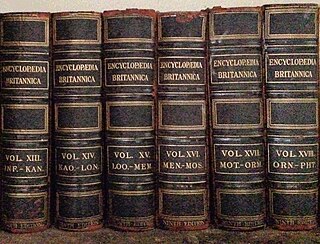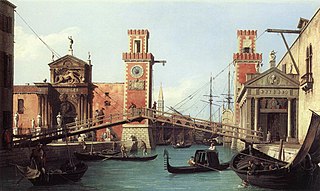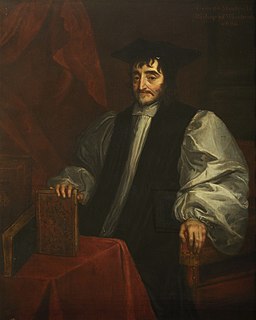
An encyclopedia or encyclopædia is a reference work or compendium providing summaries of knowledge from either all branches or from a particular field or discipline. Encyclopedias are divided into articles or entries that are often arranged alphabetically by article name and sometimes by thematic categories. Encyclopedia entries are longer and more detailed than those in most dictionaries. Generally speaking, unlike dictionary entries—which focus on linguistic information about words, such as their etymology, meaning, pronunciation, use, and grammatical forms—encyclopedia articles focus on factual information concerning the subject named in the article's title.

Pope Siricius was Pope from December 384 to his death in 399. He was successor to Pope Damasus I and was himself succeeded by Pope Anastasius I.

An arsenal is a place where arms and ammunition are made, maintained and repaired, stored, or issued, in any combination, whether privately or publicly owned. Arsenal and armoury or armory are mostly regarded as synonyms, although subtle differences in usage exist.

Sir Sidney Lee was an English biographer, writer and critic.
The Keeper or Master of the Rolls and Records of the Chancery of England, known as the Master of the Rolls, is the second-most senior judge in England and Wales after the Lord Chief Justice, and serves as President of the Civil Division of the Court of Appeal and Head of Civil Justice. The position dates from at least 1286, although it is believed that the office probably existed earlier than that.

George Morley was an English Anglican bishop, Bishop of Worcester and then of Winchester.
An allonge is a slip of paper affixed to a negotiable instrument, as a bill of exchange, for the purpose of receiving additional endorsements for which there may not be sufficient space on the bill itself. An endorsement written on the allonge is deemed to be written on the bill itself. An allonge is more usually met with in countries using the Napoleonic Code, as the code requires every endorsement to express the consideration. Under English law, the simple signature of the endorser on the bill, without additional words, is sufficient to operate as a negotiation and so an allonge is seldom necessary.
Irregardless is a word sometimes used in place of regardless or irrespective, which has caused controversy since the early twentieth century, though the word appeared in print as early as 1795. Most dictionaries list it as non-standard or incorrect usage, and recommend that "regardless" should be used instead.
In English law, an estover is an allowance made to a person out of an estate, or other thing, for his or her support. Estovers are wood, that a tenant is allowed to take, for life or a period of years, from the land he holds for the repair of his house, the implements of husbandry, hedges and fences, and for firewood.

An avant-corps refers to a part of a building, such as a porch or pavilion, that juts out from the corps de logis, usually over the full height of the building. It is common in façades in the Baroque period.
Camlet, also commonly known as camelot or camblet, is a woven fabric that might have originally been made of camel or goat's hair, later chiefly of goat's hair and silk, or of wool and cotton. The original form of this cloth was very valuable; the term later came to be applied to imitations of the original eastern fabric.

In pre-modern chemistry and alchemy, cohobation was the process of repeated distillation of the same matter, with the liquid drawn from it; that liquid being poured again and again upon the matter left at the bottom of the vessel. Cohobation is a kind of circulation, only differing from it in this, that the liquid is drawn off in cohobation, as in common distillation, and thrown back again; whereas in circulation, it rises and falls in the same vessel, without ever being drawn out.

In engue, a engue' was a kind of clapper or castanet used in religious dances by groups in ancient Greece and elsewhere, including the Korybantes.
Druggett or drugget is "a coarse woollen fabric felted or woven, self-coloured or printed one side". Jonathan Swift refers to being "in druggets drest, of thirteen pence a yard".
John Sandale was a Gascon medieval Lord High Treasurer, Lord Chancellor and Bishop of Winchester.

Justice of the Common Pleas was a puisne judicial position within the Court of Common Pleas of England and Wales, under the Chief Justice. The Common Pleas was the primary court of common law within England and Wales, dealing with "common" pleas. It was created out of the common law jurisdiction of the Exchequer of Pleas, with splits forming during the 1190s and the division becoming formal by the beginning of the 13th century. The court became a key part of the Westminster courts, along with the Exchequer of Pleas and the Court of King's Bench, but with the Writ of Quominus and the Statute of Westminster, both tried to extend their jurisdiction into the realm of common pleas. As a result, the courts jockeyed for power. In 1828 Henry Brougham, a Member of Parliament, complained in Parliament that as long as there were three courts unevenness was inevitable, saying that "It is not in the power of the courts, even if all were monopolies and other restrictions done away, to distribute business equally, as long as suitors are left free to choose their own tribunal", and that there would always be a favourite court, which would therefore attract the best lawyers and judges and entrench its position. The outcome was the Supreme Court of Judicature Act 1873, under which all the central courts were made part of a single Supreme Court of Judicature. Eventually the government created a High Court of Justice under Lord Coleridge by an Order in Council of 16 December 1880. At this point, the Common Pleas formally ceased to exist.

The word bespoke has evolved from a verb meaning "to speak for something" to its contemporary usage as an adjective that has changed from describing first tailor-made suits and shoes, and later, to anything commissioned to a particular specification, and finally to a general marketing and branding concept implying exclusivity and appealing to snobbery.











